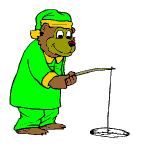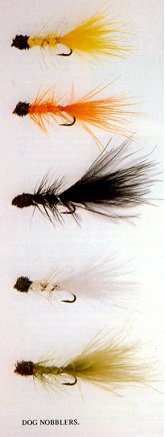

Ok here are some tips if you are just starting out. Please remember that I'm no fishing guru I just enjoy the sport a lot. I have picked up a few tips from people I have fished with throughout the years and from books or magazines I have read. I would like to pass them on to you here in the hope that they will help you be more successful in your fishing ventures. Don't email me saying "You are doing it all wrong" I'm not saying that the way I fish is the right way to do it! I'm merely saying I've had a moderate amount of success doing it this way. I suppose every fisherman develops his own style and has his favourite techniques. Maybe some of these ideas may just help increase your catch ! Then again maybe not !
So you have arrived at the loch and your ready to get tackled up. This is where the fun begins.
I would suggest personal preference here. Fish with what length of rod you feel most comfortable with. If you feel that the fish are all lying around the edges of the loch and you are going to be bank fishing you may prefer to use a shorter length rod. If you feel you need a longer cast to get to where the fish are use a longer rod. If you are fishing a river use a rod of appropriate length to cover all the water you can without over casting and tangling your flies up on the opposite river bank. (Note that striving to get the longest cast you can across a river is not always the best method for river fishing. More often than not the fish will be resting at the rivers edge)

What determines the kind of line you should use? Well the options are floating, intermediate, sinking, fast sinking. It gets a lot more complex than that but we dont want to get to technical (at least I don't). To pick the correct line to use you have to guess at which level or depth the fish are feeding at. This is done when first arriving at the loch by looking at the loch and the weather. Can you see trout rising? If you can this would suggest using a floating line or perhaps an intermediate line. This way you can be sure you are fishing your flies at the correct level. If no fish can be seen then perhaps trying a slow sink or fast sink line would be the better option. You will be able to tell better when you actually start to fish the loch. If your still not sure try asking the local fishermen. Local knowledge is sometimes the best help you can get. The weather is also a determining factor when deciding which line to use. Normaly bright sunny days are more comfortable to fish on but unfortunately the majority of the time they will be less productive. Dull weather and a light breeze causing a bit of a wave on the loch is usually the best conditions for loch fishing. Certainly the offers seem to be more frequent in these conditions.

If you are just starting out and your unsure of your fly selection have a look around and look to see what other fishermen are fishing. If there is good insect life flying around or on the water surface you will probably find that most fishermen will try to "Match The Hatch" by this we mean try to tie on flies that look most like the insects that are flying around you or floating in the surface film of the loch. It is generaly a good idea to try and balance your cast as well. This means tie your heaviest fly on the point of your cast the second heaviest on the middle dropper and the lightest on the top dropper (bob fly). This is assuming you are fishing three flies. It is quite acceptable to fish only two or even one fly until you are quite competent at casting. Walk before you try to run or you will probably spend the majority of the day untying knots. If you balance your cast in this way you will find that you get less wind knots and tangles. You should also find casting easier and the presentation of the flies will be more acceptable to your quarry.
If you are bank fishing dont be to keen to go rushing into the water. Fish the water in front of you before stepping in. There could be a fish sitting just two feet of the bank. It is generaly a good idea to try not to disturb the water if you can. If you can see fish rising just out of reach then wade in very gently and slowly. Don't stand rooted to the spot. If nothing is happening then move! Try fishing right along the loch edge. Remember to give other bank fishermen enough room to fish and be very careful especially if youre wearing chest waders not to fall in. It's very easy to get over engrossed in your fishing and loose your footing. If your going out in a boat unless you know of a "hot spot" on the loch It is a good idea to drift the loch and cover as much water as you can. If you do hit a good spot do the same drift again or anchor at that point but remember not to anchor in front of another drifting boat. Should the wind be blowing strongly you should use a drogue to slow the boat down to an appropriate drifting speed this will give your flies enough time to reach the required depth at which you wish to fish them. The boat can be manouvered and positioned by moving the the drogue attachment point on the boat. If there are two people fishing in the boat then the wind can be used to manouvre the boat by standing up and sitting down eg the person standing will act like a sail and cause the boat to turn. both individuals standing up will cause the boat to drift faster. The length of rope used on the drogue will also affect the drift speed (eg more rope equals drogue deeper equals more drag equals slower drift speed !)